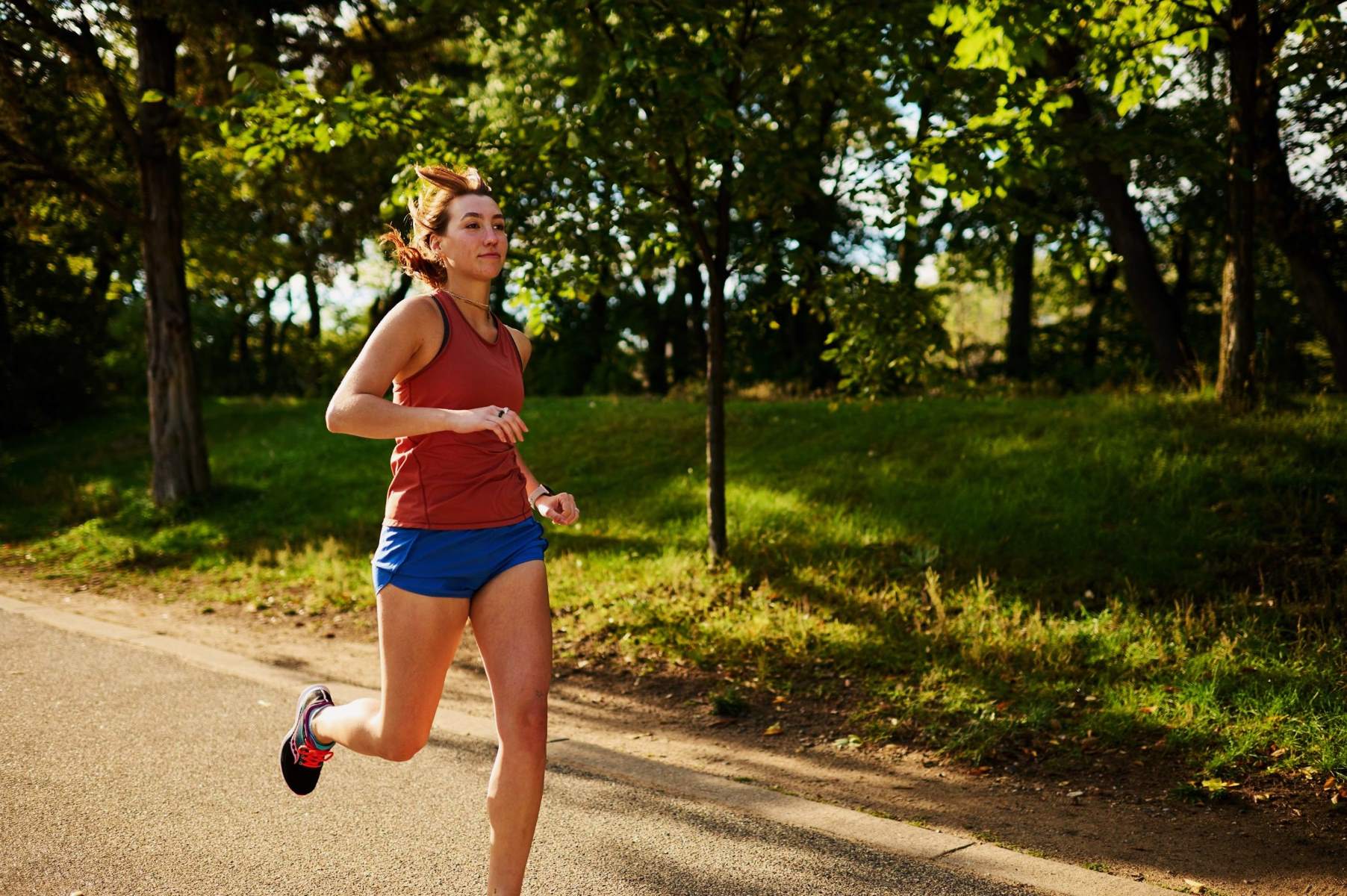Home>Health & Nutrition>The Recommended Sugar Intake For Runners


Health & Nutrition
The Recommended Sugar Intake For Runners
Published: February 20, 2024
Discover the recommended sugar intake for runners and how it impacts their health and nutrition. Learn how to optimize your diet for peak performance.
(Many of the links in this article redirect to a specific reviewed product. Your purchase of these products through affiliate links helps to generate commission for Therunningadvisor.com, at no extra cost. Learn more)
Table of Contents
Understanding the Role of Sugar in Running Performance
Sugar plays a crucial role in the performance of runners by providing a quick source of energy. When consumed, sugar is broken down into glucose, which is then transported to the muscles to fuel physical activity. During running, the body relies on glucose as a primary energy source, especially during high-intensity workouts or long-distance runs. This is because glucose is readily available and can be rapidly utilized by the muscles to sustain performance.
In addition to providing energy, sugar also influences hydration during running. Carbohydrates, which are broken down into sugars, help the body retain water, which is essential for maintaining optimal performance and preventing dehydration during exercise. Furthermore, sugar consumption can impact the release of insulin, a hormone that regulates blood sugar levels. This is particularly important for runners as it affects the body's ability to efficiently utilize glucose for energy.
It's important to note that while sugar can be beneficial for running performance, the type and timing of sugar intake are critical. Simple sugars, such as those found in candy and sugary drinks, can provide a quick energy boost but may lead to rapid spikes and crashes in blood sugar levels. On the other hand, complex carbohydrates, such as those found in whole grains and fruits, provide a more sustained release of energy, making them a favorable choice for runners.
Understanding the role of sugar in running performance involves recognizing the balance between providing the necessary energy for optimal performance and avoiding potential negative effects of excessive sugar consumption. By being mindful of the types of sugars consumed and their timing, runners can harness the benefits of sugar to enhance their running performance while maintaining overall health and well-being.
Read more: Is ‘crash’ Training Recommended For Runners?
Factors to Consider When Determining Sugar Intake for Runners
When determining the appropriate sugar intake for runners, several key factors come into play. Understanding these factors is essential for optimizing running performance and overall health. Here are the critical considerations for runners when evaluating their sugar intake:
-
Training Intensity and Duration: The intensity and duration of training sessions significantly impact the body's energy requirements. High-intensity workouts and long-distance runs demand a greater need for energy, which may necessitate a strategic intake of sugars to sustain performance. Runners engaging in rigorous training regimens should consider adjusting their sugar intake to meet the increased energy demands during workouts.
-
Individual Energy Needs: Each runner has unique energy requirements based on factors such as body composition, metabolism, and training goals. It's crucial for runners to assess their individual energy needs and tailor their sugar intake accordingly. Factors such as age, gender, weight, and training volume should be taken into account when determining the appropriate amount of sugar needed to support running performance.
-
Nutritional Timing: The timing of sugar consumption in relation to running sessions is a critical factor to consider. Consuming sugars before a run can provide a quick source of energy, while consuming them during or after a run can aid in replenishing glycogen stores and facilitating muscle recovery. Runners should strategically time their sugar intake to optimize energy levels and support post-run recovery.
-
Type of Sugar: Not all sugars are created equal. Runners should be mindful of the types of sugars they consume, focusing on complex carbohydrates found in whole foods such as fruits, vegetables, and whole grains. These sources of sugar provide sustained energy release and essential nutrients, making them favorable choices for runners. Conversely, excessive consumption of simple sugars, such as those found in processed foods and sugary beverages, can lead to rapid spikes and crashes in blood sugar levels, potentially impacting running performance.
-
Hydration Status: Proper hydration is essential for runners, and sugar intake can influence hydration levels. Carbohydrates, including sugars, play a role in fluid retention, which can impact hydration status during running. Runners should consider their hydration needs in conjunction with their sugar intake to maintain optimal performance and prevent dehydration.
By carefully considering these factors, runners can make informed decisions regarding their sugar intake, ensuring that it aligns with their energy requirements, training goals, and overall well-being. Balancing sugar intake with other essential nutrients and hydration is key to supporting running performance and maximizing the benefits of sugar consumption.
The Impact of Excessive Sugar Consumption on Running Performance
Excessive sugar consumption can significantly impact a runner's performance and overall well-being. While sugar serves as a vital source of energy for runners, consuming it in excess can lead to adverse effects that hinder performance and compromise health. Understanding the potential impact of excessive sugar consumption is crucial for runners to make informed choices about their dietary habits and optimize their running performance.
One of the primary concerns associated with excessive sugar intake is its potential to cause rapid spikes and subsequent crashes in blood sugar levels. When runners consume high amounts of simple sugars, such as those found in sugary snacks and beverages, the body experiences a surge in blood sugar levels, leading to a sudden burst of energy. However, this rapid increase is often followed by a sharp decline, causing a subsequent drop in energy levels. This fluctuation can negatively affect running performance, leading to fatigue, decreased endurance, and diminished overall athletic output.
Moreover, excessive sugar consumption can contribute to weight gain and body composition changes, which can impact a runner's performance. High sugar intake, particularly from sources like processed foods and sweetened beverages, can lead to an increased calorie intake, potentially resulting in weight gain and a higher body fat percentage. These changes can impair running performance by affecting speed, agility, and overall endurance, as excess body weight can place additional strain on the muscles and joints during running.
Furthermore, prolonged excessive sugar consumption can lead to insulin resistance, a condition in which the body's cells become less responsive to the effects of insulin. This can disrupt the body's ability to efficiently utilize glucose for energy, leading to decreased energy availability for running and impaired recovery post-exercise. Additionally, insulin resistance is associated with an increased risk of developing type 2 diabetes, a condition that can have serious implications for a runner's health and long-term athletic performance.
In addition to the physiological impacts, excessive sugar consumption can also affect mental clarity and focus, which are essential for maintaining optimal running performance. Fluctuations in blood sugar levels can lead to mood swings, decreased cognitive function, and reduced mental alertness, all of which can hinder a runner's ability to stay focused and perform at their best during training sessions and races.
By understanding the potential impact of excessive sugar consumption on running performance, runners can make informed dietary choices to support their athletic endeavors. Striking a balance between obtaining the necessary energy from sugars and avoiding the pitfalls of excessive consumption is essential for optimizing running performance and promoting overall health and well-being.
Tips for Managing Sugar Intake as a Runner
Managing sugar intake is a crucial aspect of a runner's dietary strategy, impacting both performance and overall health. Here are some valuable tips to effectively manage sugar intake and optimize running performance:
-
Prioritize Whole Foods: Emphasize whole foods such as fruits, vegetables, and whole grains as primary sources of sugar. These foods provide complex carbohydrates, fiber, and essential nutrients, offering a sustained release of energy and supporting overall health. Incorporating a variety of colorful fruits and vegetables into your diet not only provides natural sugars but also delivers vital vitamins, minerals, and antioxidants that contribute to optimal running performance.
-
Strategic Pre-Run Fueling: Before a run, consider consuming a balanced meal or snack that includes complex carbohydrates to provide a gradual release of energy. Opt for whole grain bread, oatmeal, or fruits to fuel your run effectively. This approach helps maintain steady blood sugar levels and sustains energy throughout the run, preventing rapid energy spikes and crashes.
-
Mindful Post-Run Recovery: Following a run, prioritize replenishing glycogen stores and facilitating muscle recovery by consuming a combination of carbohydrates and protein. This can include options such as a fruit smoothie with added protein, whole grain toast with nut butter, or a balanced meal containing lean protein and complex carbohydrates. By strategically managing sugar intake during the post-run period, runners can support muscle repair and glycogen restoration, enhancing recovery and preparing for subsequent training sessions.
-
Read Food Labels: Be mindful of hidden sugars in processed foods and beverages. Reading food labels can help identify added sugars and make informed choices about the products you consume. Look for terms such as sucrose, high-fructose corn syrup, and other sweeteners in the ingredient list. Opt for minimally processed foods and beverages to reduce unnecessary sugar intake and support overall health.
-
Hydration with Natural Options: Hydration is essential for runners, and choosing natural options for hydration can help manage sugar intake. Consider hydrating with water, coconut water, or homemade fruit-infused water to maintain fluid balance without excessive added sugars. Avoid sugary sports drinks unless engaging in prolonged, high-intensity exercise that warrants additional carbohydrate replenishment.
-
Balanced Snacking: When snacking, opt for balanced choices that combine carbohydrates with protein and healthy fats. This can include options such as apple slices with nut butter, Greek yogurt with berries, or whole grain crackers with cheese. Balancing sugar intake with other macronutrients helps regulate blood sugar levels and provides sustained energy, supporting overall running performance.
By implementing these tips, runners can effectively manage their sugar intake, optimize energy levels, and support overall health, ultimately enhancing their running performance and achieving their training goals.
Recommended Sources of Sugar for Runners
When it comes to obtaining sugar as a source of energy for running, it's essential for runners to prioritize nutrient-dense and wholesome options that provide sustained energy release and essential nutrients. Opting for natural sources of sugar can not only fuel running performance but also contribute to overall health and well-being. Here are recommended sources of sugar for runners to consider incorporating into their dietary regimen:
Read more: The Optimal Protein Intake For Runners
1. Fruits:
Fruits such as bananas, oranges, berries, and apples are excellent sources of natural sugars, primarily in the form of fructose. These fruits also contain essential vitamins, minerals, and antioxidants, making them valuable for supporting overall health and providing sustained energy for running. The fiber content in fruits contributes to gradual sugar absorption, preventing rapid spikes in blood sugar levels and promoting long-lasting energy.
2. Whole Grains:
Whole grains, including oats, quinoa, brown rice, and whole grain bread, provide complex carbohydrates that break down into glucose, offering a steady release of energy. These sources of sugar are accompanied by fiber, protein, and various micronutrients, making them ideal for sustaining energy levels during running and supporting post-exercise recovery.
3. Sweet Potatoes:
Sweet potatoes are a nutrient-dense carbohydrate source that offers natural sugars along with a host of essential nutrients, including vitamin A, vitamin C, and potassium. The natural sugars in sweet potatoes provide a sustained energy release, making them a valuable addition to a runner's diet for supporting training sessions and promoting overall health.
4. Honey:
As a natural sweetener, honey can serve as a source of quick-release energy for runners. It contains a blend of glucose and fructose, making it an effective option for pre-run fueling or mid-run energy boosts. Additionally, honey offers antioxidant and antimicrobial properties, contributing to its potential health benefits for runners.
Read more: Top 5 Calf Stretches Recommended For Runners
5. Dried Fruits:
Dried fruits such as raisins, dates, and apricots provide concentrated sources of natural sugars, offering a convenient and portable energy source for runners. While dried fruits are high in natural sugars, they also contain fiber, vitamins, and minerals, making them a practical option for sustaining energy levels during long-distance runs or intense training sessions.
By incorporating these recommended sources of sugar into their dietary intake, runners can effectively fuel their performance, support their training endeavors, and promote overall health. These natural sources of sugar offer a balanced approach to energy provision, delivering essential nutrients alongside sustained energy release, ultimately contributing to optimized running performance and well-being.














